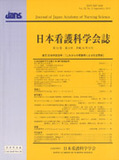Japanese
English
- 販売していません
- Abstract 文献概要
- 参考文献 Reference
要旨
目的:認知症高齢者の家族を支援する能力の育成を目的とした「家族支援能力育成プログラム」を通所介護職員に対して実施し,その効果を検証することとした.
方法:通所介護施設ごとに介入群と対照群に無作為割付し,介入群施設職員41名と家族48名,対照群施設職員22名と家族45名を対象とした.プログラムは,認知症およびその対処方法,家族介護者支援方法についての講義(45分間)と演習(45分間)で構成した.データを両群のベースラインと3ヵ月後に,介入群ではプログラム実施直後にも収集した.
考察:介入群職員のプログラム実施直後の認知症の行動・心理症状(BPSD)への対応に関する知識習得効果があるものの,経時的に縮小傾向がみられることから,効果を維持するために追加介入等の必要性が示唆された.また,職員共感スケールの「職員は気持ちを解ってくれる」の項目で効果がみられたことから,職員の共感を増強する効果があると思われる.
Abstract
Purpose: The purpose of this study was to examine the effects of a family support program for staff supporting family members of persons with dementia receiving day service.
Methods: Subjects included staff and families who were randomly assigned to an experimental group or a control group (experimental group; staff n=41, families n=48, control group; staff n=22, families n=45).
The program was composed of a 45-minute lecture and 45 minutes of exercises regarding dementia approaches and how to support families. The data were collected at baseline and after three months for both groups, and the experimental group's data was also collected immediately after the program.
Conclusion: In the experimental group, the staff's dementia knowledge increased immediately after the program, but these effects diminished over time, suggesting a need for adding periodic “boosters” to the program design.
The Staff Empathy Scale asked families the degree to which they perceive staff as being understanding. This item increased after participation in the program, demonstrating the effectiveness of the program in increasing the empathy of the staff.
Copyright © 2012, Japan Academy of Nursing Science. All rights reserved.


